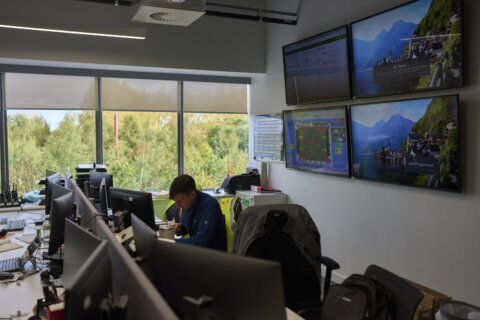When evaluating potential hires, employers want to ensure that candidates have the skills for the position and will be a good cultural fit. To determine the latter, employers may ask a question about your ideal work environment during the interview. Here’s how to prepare for and answer this question to ensure you nail the job interview.
[READ: Common Job Interview Questions and How to Answer Them.]
Why Work Environment Is Important
You may love many elements of your job, but if the work environment is not the right fit, you may not stay long at the company. In fact, the Great Resignation during the COVID-19 pandemic largely resulted from employees’ dissatisfaction with their work environments. So to make sure a position is a good fit for you, it’s important to identify your ideal work environment.
Examples of Ideal Work Environments
Your ideal work environment depends on your strengths, values and personality type. Here are some examples of ideal work environments for different types of people.
Extroverts. Open spaces that encourage collaboration and spur brainstorming sessions may be best for extroverts.
Introverts.Workplace introverts may prefer a private space where they can work independently and have more quiet time.
Detail-oriented employees. People drawn to details may prefer an organization with clearly defined processes and structure.
Creative thinkers. A startup with a flexible culture that allows for freedom of expression is likely an ideal fit for creative types.
Analytical thinkers. People with strong analytical skills may gravitate to data-driven work environments and companies that value and promote employees adept at problem-solving.
Strong communicators. Those with great people skills may be happiest in a work environment that values and encourages interpersonal connections and a position that involves helping others.
Lifelong learners. An employee who prioritizes professional development may thrive at a company that encourages learning new skills, offers employee development and mentorship programs, and provides access to professional training.
Boundary setters. A work environment that promotes employee well-being and offers flexibility is an ideal fit for someone who doesn’t want to compromise on work-life balance. This could include remote or hybrid work options.
[READ: 10 Types of Annoying Co-Workers and How to Deal With Them.]
How to Determine Your Ideal Work Environment
Your ideal work environment depends on factors including the physical space, the people, the schedule and the company culture. Take some time to consider what type of work environment you prefer, taking into account your strengths, values and personality type. It may also be helpful to think about your past jobs. What have you liked and disliked about company cultures, co-workers and schedules?
Try journaling about your ideal work environment. How would you describe it? If the sky is the limit, what would you want? If you think of the different aspects of a work environment in that way, a preference should emerge. The bigger your dream, the closer you will get to what you want, even if you later determine that you are willing to compromise in certain areas.
Why Employers Ask About Work Environment During a Job Interview
A job interview is an opportunity for an employer to get to know a potential hire’s personality and preferences. A good hiring manager will want to ensure that a job candidate will be a strong long-term fit for their company. This type of interview question can give a hiring manager insight into your preferences and if those preferences align with company culture. Hiring the right person benefits the company in the long term because this minimizes job turnover and promotes productivity.
[What Not to Say in an Interview — Even If It’s True]
How to Answer ‘What Is Your Ideal Work Environment?’
When preparing your answer to this job interview question, it’s important to do your research. Aim to identify the organization’s work environment by checking its social media profiles, reading articles, scanning employee reviews and asking your network. Also review the job listing for keywords that could give you a sense of the work environment, such as “collaborative” or “structured.”
If you see a fit, consider tailoring your answer to this question to show that your preferences are compatible with the company’s work environment. For example, “I work best in a collaborative environment where open communication and teamwork are emphasized. I enjoy brainstorming with a team and believe that working together leads to innovative solutions. For example, in my last role, I was part of a team working on a new product launch. Our regular brainstorming sessions led to a streamlined marketing campaign that increased overall engagement by 10%.”
Avoid being vague in your answer. If you say, “I can work anywhere,” this comes across as a lack of self-awareness. Keep your answer positive and avoid focusing on aspects of work environments that you don’t enjoy. Instead of saying, “I can’t work in disorganized environments,” highlight your enthusiasm for the organization by saying something like, “I thrive in an environment where there are efficient systems in place to keep projects on track. I find that having structure allows me to stay focused and deliver high-quality work.”
Although you want to stay true to yourself and honor your values, think about what aspects of your ideal work environment where you might be open to compromise. Hiring managers value employees who are willing to be flexible, even when they have a preferred work environment.
For example, if you work best in a quiet environment, instead of telling a hiring manager, “I can only work in quiet spaces,” you might say, “I find I am most productive in environments that minimize distractions, as this helps me focus. However, I’m also flexible and can adapt to different work styles to contribute effectively to the team as long as I can find ways to create a focused workflow when needed.”
Taking the time to identify your ideal work environment and craft your answer to this job interview question is worth the effort. It can make the difference between settling for a job and securing a role where you can thrive.
More from U.S. News
5 Workplace Trends That Employers Love and Workers Hate
7 Benefits of Working From Home (and 7 Drawbacks)
How to Answer ‘Tell Me About Yourself’ in a Job Interview
The Best Ways to Answer ‘What Is Your Ideal Work Environment?’ originally appeared on usnews.com







